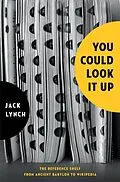"Knowledge is of two kinds," said Samuel Johnson in 1775. "We know a subject ourselves, or we know where we can find information upon it." Today we think of Wikipedia as the source of all information, the ultimate reference. Yet it is just the latest in a long line of aggregated knowledge--reference works that have shaped the way we've seen the world for centuries. You Could Look It Up chronicles the captivating stories behind these great works and their contents, and the way they have influenced each other. From The Code of Hammurabi, the earliest known compendium of laws in ancient Babylon almost two millennia before Christ to Pliny's Natural History; from the 11th-century Domesday Book recording land holdings in England to Abraham Ortelius's first atlas of the world; from Samuel Johnson's A Dictionary of the English Language to The Whole Earth Catalog to Google, Jack Lynch illuminates the human stories and accomplishment behind each, as well as its enduring impact on civilization. In the process, he offers new insight into the value of knowledge.
Autorentext
Jack Lynch is a professor of English at Rutgers University and a Johnson scholar, having studied the great lexicographer for nearly a decade. In addition to his books on Johnson and on Elizabethan England, he has written journal articles and scholarly reviews, and hosts a Web site devoted to these topics at http://andromeda. rutgers.edu/~jlynch/18th/. He is the author of Becoming Shakespeare and Samuel Johnson's Insults and the editor of Samuel Johnson's Dictionary. He lives in Lawrenceville, NJ.
